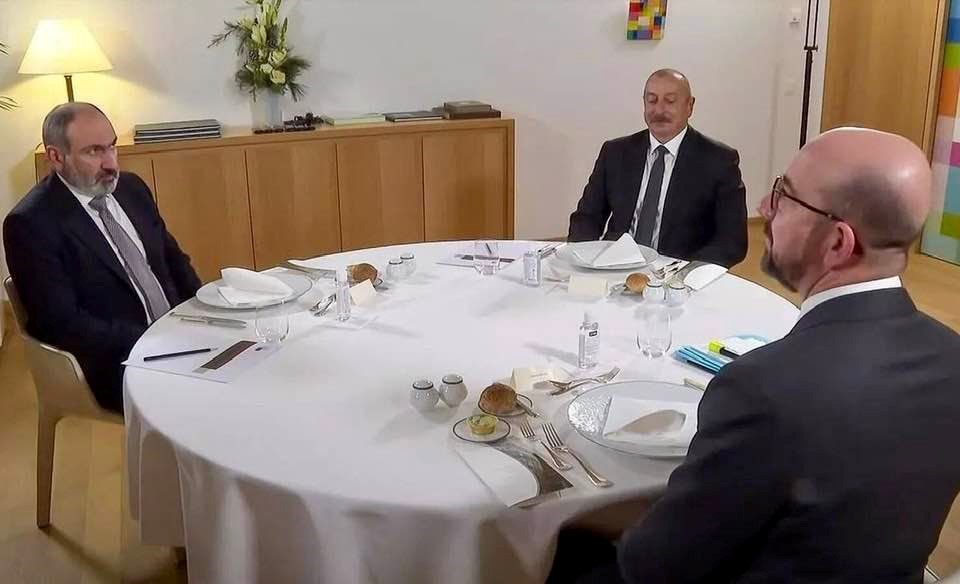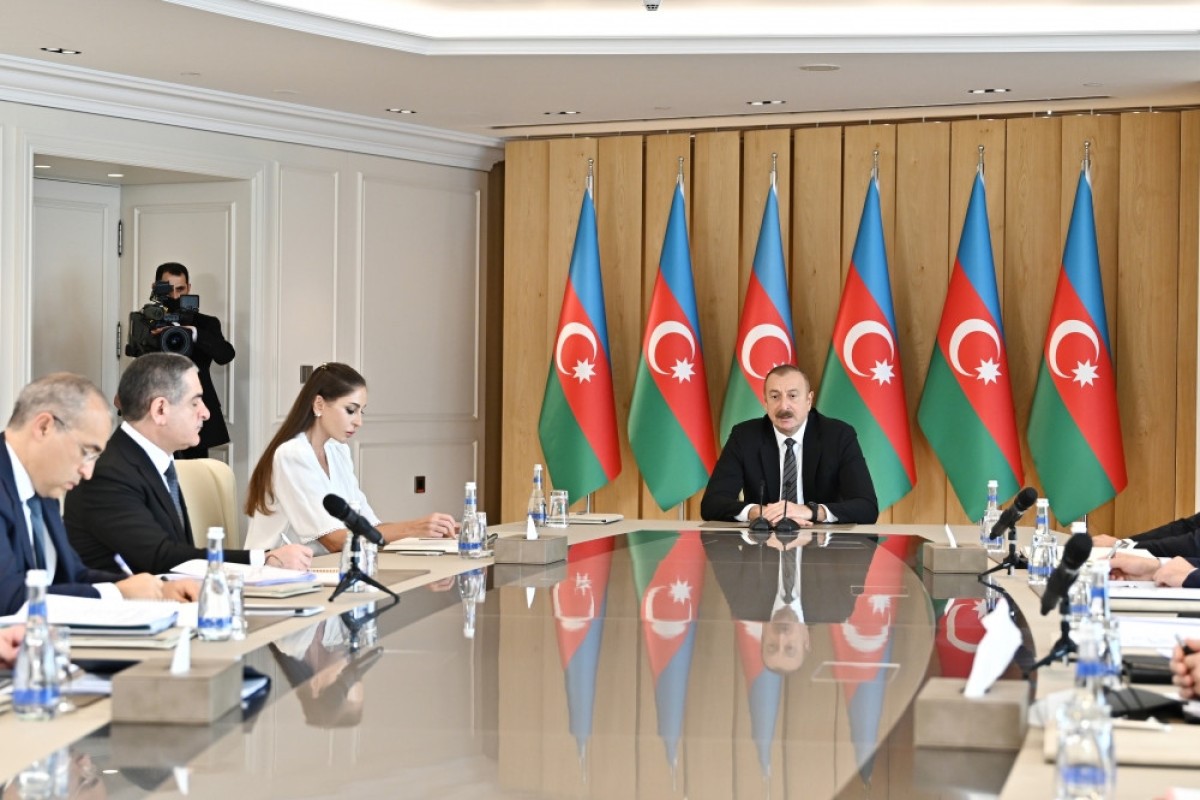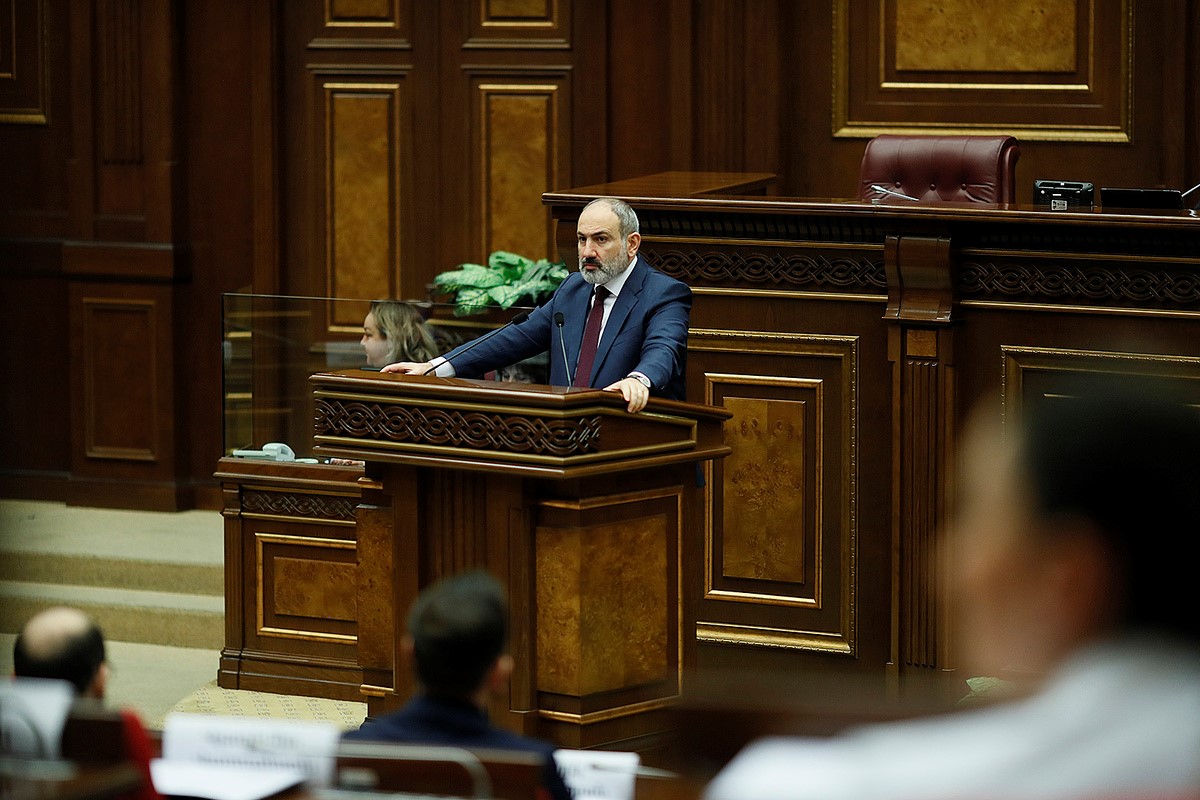RONDELI BLOG
Will Pashinyan Be Able to Make a Drastic Turnaround in Armenian-Azerbaijani Relations?
Zurab Batiashvili, Research Fellow at the Rondeli Foundation
After the end of the second Karabakh war, it became clear that the relations between Armenia and Azerbaijan require normalization.
However, it is also clear that this is not an easy goal to achieve. This requires Yerevan to recognize the principle of the territorial integrity of Azerbaijan. The current Armenian government views the process positively; however, this idea also has its opponents who consider this step tantamount to the abandonment of Karabakh.
Now, the main question is whether or not Pashinyan will be able to make a fundamental change in Armenian-Azerbaijani relations?
Negotiation Process
The Armenian-Azerbaijani negotiation process began shortly after the war and was mainly mediated by Russia.
This process was bumpy (serious clashes between the Armenian and Azerbaijani sides have taken place many times). Various agreements (for example, on the opening of communications) were also reached at these meetings. However, it has always been hard to implement these agreements in real life.
The last meeting between the President of Azerbaijan, Ilham Aliyev, and the Prime Minister of Armenia, Nikol Pashinyan, took place on April 6, 2022 in Brussels. It is important that this meeting took place without Russian participation. Naturally, the Kremlin involved in Russia‘s war against Ukraine has little time for the South Caucasus. Hence, mediation was done by the European Union in this case and it seems that the parties have made significant progress during the meeting in Brussels.

Trilateral meeting organized by the European Union on April 6 in Brussels
The Council of Europe President, Charles Michel, called the trilateral meeting productive, adding that the leaders of the two countries agreed to "move rapidly" towards a peace agreement.
Returning to Baku, the President of Azerbaijan, during a meeting with the members of his own government, expressed satisfaction with the meeting in Brussels, adding that it became clear to him that "Armenia is abandoning territorial claims."

Aliyev meeting with members of the Cabinet of Ministers of Azerbaijan
It should also be noted that despite the meeting in Brussels, Russia has not been completely excluded from the process. Pashinyan's visit to Russia is scheduled for April 19 where he will meet with Putin and, most likely, discuss the above-mentioned issue.
Pashinyan’s Address to the Parliament
Returning to his homeland after the meeting in Brussels, Pashinyan quickly took action and made important statements. In particular, in his speech to the Armenian Parliament on April 13, Pashinyan said that his government is ready to recognize the territorial integrity of Azerbaijan.
In addition, Pashinyan said in his speech: "It is my fault that in 2018-2019 I did not inform the public that our close or distant friends were asking us to hand over seven districts to Azerbaijan with this or that configuration and lower the requirements on the status of Artsakh.[1] I am guilty of not telling the people that the international community unequivocally recognizes the territorial integrity of Azerbaijan and expects us to follow the suit, they also expect to fully engage the Azerbaijanis who left Karabakh in determining and managing the future of Nagorno-Karabakh."

Pashinyan's speech in the Armenian Parliament
Pashinyan added: "Today, the international community clearly tells us that we are the only country in the world that does not recognize the territorial integrity of Azerbaijan, an ally of Turkey, and that it is very dangerous not only for Karabakh but also for Armenia.
Today, the international community is clearly telling us that we need to lower our requirements on the status of Nagorno-Karabakh.”
He added that he wants to sign an agreement with Azerbaijan as soon as possible which includes the recognition of each other's territorial integrity and noted that it is acceptable for Yerevan.
Although Pashinyan did not openly say whether or not his administration was ready to recognize Azerbaijan's sovereignty over Karabakh, it is clear that this is implied. He only noted the importance of "the security guarantees, rights and freedoms for the Armenians living in Karabakh."
Reactions to Pashinyan’s Speech
The opposition (there are many politicians with positive attitudes about Russia) did not attend Pashinyan’s speech in the parliament but Ishkhan Saghatelian, the Vice-Speaker of the Parliament, who is a representative of the opposing Armenian Alliance (this two-party alliance created by the former President, Robert Kocharian, in 2021 includes the Armenian Revival Party and the Dashnak Party) said:
"It means that we will completely lose Artsakh [Nagorno Karabakh] because if we choose this route, Armenians will leave Artsakh. And this is completely unacceptable for us."
Saghatelian added that the only way to avoid such a scenario is to change the Armenian government. However, he did not specify how the opposition intends to do so given that after the defeat in the Karabakh war, Pashinyan held early parliamentary elections on June 20, 2021 and won convincingly (he received 53.9% of the vote, in other words, he has strong support in Armenian society).
The only thing that is known at the moment is that the opposition is planning to hold protest rallies in the near future, similar to the one held on April 5 by the Armenian Alliance together with the second opposition bloc, Pativ Unem.
Representatives of the self-proclaimed Karabakh government also opposed Pashinyan. According to the so-called “Minister of Foreign Affairs of Karabakh,” Davit Babalian, "any attempt to incorporate Artsakh into Azerbaijan will lead to the bloodshed and destruction. Our red line is that we will not be part of Azerbaijan."
The self-proclaimed "President of Karabakh," Araik Harutyunyan, also said that the Armenians of Karabakh will not give up their right to self-determination.
The Azerbaijani factor is a very important issue with which both supporters of Pashinyan and his opponents have to contend. Since the start of Russia’s war against Ukraine war, the Russian Defense Ministry has twice identified the fact of the Azerbaijani side moving positions deep into Karabakh. The last such case occurred on April 16. Russia was powerless to change the situation in both cases. Obviously, this situation worries the Armenian side, which sees it as pressure, especially in the light of Russia's lack of success in its ongoing war with Ukraine.
Conclusion
- The Armenian Prime Minister, Nikol Pashinyan, is trying to make a drastic change in Azerbaijan-Armenia relations. He believes that now that the Second Karabakh War is over, there is a chance for positive bilateral relations (it should be noted that Armenia has begun such a reconciliation process with Turkey as well);
- This process is accelerated by Russia's failed war in Ukraine which has already precipitated the weakening of Russia's global positions. Russia’s future is even more unclear. It is because of this reality that the Armenian government is trying to negotiate with Azerbaijan on relatively better terms (while it is still possible);
- The Armenian opposition and the self-proclaimed government of Karabakh are trying to oppose this process. However, it is clear that their resources are limited at this point and Pashinyan also has more solid ground;
- Currently, Russia's ability to have a negative impact on Azerbaijan-Armenia relations is limited. Involved in a war against Ukraine, the Kremlin has neither the time nor the sufficient military or intellectual resources to do so;
It is in Georgia 's interest to have lasting peace in the region (particularly important is the fact that the West is intensifying its efforts to resolve the problems in our region) which will enable greater security and development (including joint projects and investments) throughout the South Caucasus.
Related posts
- A Looming Winter Energy Crisis in Europe: Can Azerbaijan Become the Continent’s Next Large Energy Supplier?
- War in Ukraine and Russia’s declining role in the Karabakh peace process
- The Russian Exclave of Kaliningrad and the Lithuanian "Sting"
- In line for the candidate status, Georgia will get a European perspective. What are we worried about?
- The break-up of the Hungarian-Polish coalition - an opportunity for the EU
- Failed Tskhinvali Referendum
- The War and Georgia
- "Autocratic Peace"
- “Rural Orbanism”- Polarization as a determinant for Hungary's political future
- Illegal Presidential Elections in the Tskhinvali Region: Why Bibilov Lost and What to Anticipate in Future
- How to Respond to Russian Ultra-Orthodox-Historic-Hegemonism?
- The War in Ukraine and the UK’s New Role in Eastern Europe
- What Will the Abolition of the OSCE Minsk Group Bring to the South Caucasus?
- The Presidential Election in France and Europe’s Political Future
- Why Has the Abkhaz Side Become More Active on Social Networks?
- Why a Neutral Ukraine Is Not on Putin’s Mind (Ukraine’s Neutral Status Is Getting Closer, but What Does It Mean to Putin?)
- Europe's energy future - challenges and opportunities
- Uncontrolled Mass Immigration and the Position of the Georgian Government
- Changes in Putin's propaganda narratives since the Russian invasion of Ukraine
- Ukraine will soon embark on a path of practical integration into the European Union. What about Georgia?
- Positions and Actions of Turkey in the Russo-Ukrainian War
- NATO’s possible expansion in Northern Europe and its significance for Georgia and Ukraine
- Political Winter Olympics in Beijing
- What Is behind Putin’s Sudden Gambit in Ukraine?
- Abkhazia in 2021: Energy Crisis, New “Minister” and Political Controversy
- L'Europe pourra-t-elle éviter le “déjà vu” ? (France, President of the Council of the European Union, and the Tensions in Eastern Europe)
- US-Russia Relations and the Issue of Ukraine
- The New Targets of Ramzan Kadyrov’s Regime
- What are the Prospects of the Eastern Partnership Summit Set on 15 December?
- The Upcoming EaP Summit - Why the Trio Initiative Should Finally Find Its Way
- What Will the Post-Merkel Era Mean for the EU’s Russia and Eastern Neighbourhood Policy?
- What Lies Behind the Growing Cooperation of the Georgian and Hungarian Governments
- “Doberman” as a Minister: Inal Ardzinba’s Prospects and Challenges
- The Belarus Crisis: How to Enhance Our Resilience Against the Russian Strategy for Its Near-Neighborhood
- EU-Poland’s worsened relations and what it means for the EaP
- Lessons From Germany on Political Culture: What Georgia Can Learn From the German Parliamentary Elections
- Belarus One Year On: An Insecure Regime Under Russian “Protection”
- Why Did Iran-Azerbaijan Relations Become Strained?
- Russia’s Parliamentary Elections - What Can Be Said About the Regime’s Stability
- An Emerging Foreign Policy Trend in Central and Eastern Europe: A Turn from China to Taiwan?
- Vaccination: “To Be, or not to Be”…
- Sharia Patrols in Kabardino-Balkaria: A Growing Trend or a Local Conflict?
- Belarus’ exit from the Eastern Partnership and what to expect next
- Pacta Sunt Servanda: Agreements must be kept
- Associated Trio, What is Next?
- Formation of a New “Political Elite” in Abkhazia - Who Will Replace the Old “Elite?”
- The symbolism of the EU flag and why a true Christian would not tear it down and burn it
- Securitization of the Arctic: A Looming Threat of Melting Ice
- The Victory of Nikol Pashinyan and its Potential Implications for the Region
- (Re)Mapping the EU’s Relations with Russia: Time for Change?
- What does US President Joe Biden’s Recognition of the Armenian Genocide Imply?
- ‘Vaccine Diplomacy’: A New Opportunity for Global Authoritarian Influence?
- Deal with the ‘Dragon’: What Can Be the Repercussions of the China-EU Investment Agreement?
- Who did the judge sentence: Navalny, Putin or Russia?
- Biden’s Conundrum
- 2020 Developments in Abkhazia: “Elections,” the Pandemic and Deeper Integration with Russia
- The Hungarian Crisis: Is the EU Failing against Authoritarianism?
- Could Belarus Become a Prelude to the Great Polish-Swedish War 400 Years Ago?
- COVID 19 Pandemic Economic Crisis and Reducing the Instability of Georgia’s National Currency
- Who Won and Who Lost with the War in Karabakh?
- What Russia has Gained in Karabakh
- What Armenia Did and Did not Lose as a Result of the Ceasefire Declaration in Karabakh
- Escalation of the Karabakh Conflict: Threats and Challenges for Georgia
- Some Thoughts on the Use of the Term „Post-Soviet Space“
- Georgia’s European Way During the Period of Pandemic Deglobalization
- Turkey's Caucasus Policy Against the Backdrop of the Latest Armenia-Azerbaijan Tensions
- Khabarovsk Krai Protests as an Indicator of the Russian Federation’s Stability
- Political Crisis in Occupied Abkhazia
- What is the Significance of Killing General Qasem Soleimani?
- What Will the New Dialogue Format with Russia Bring for Georgia?
- On the “Russian Culture Center” in Georgia
- Whither Economic Policy?
- Main Messages of Russian Propaganda
- Massive Cyberattacks On Georgia Calls For Defense And Resilience
- What do we know about the meeting of the Foreign Ministers of the Russian Federation and Georgia?
- New Focuses of the Anti-Occupation Policy
- Georgia's Problems are not Addressed at G7 Meetings: Who is to Blame?
- The Outcome of the European Parliament Elections - What Does it Mean for Georgia?
- Deterring Russia
- The Risk of the Renewal of the Karabakh Conflict after the Velvet Revolution in Armenia
- EU Soft Power and the Armenian [R]evolution
- The Armenian Parliament has elected a New President: Who will be the New Prime Minister?
- Presidential Elections in the South Caucasus: Who Armenia and Azerbaijan are voting for
- Is Georgia’s Export Growth Sustainable?
- Growth of Military Spending and Relations with Russia: Azerbaijan trying to Gain Advantage over Armenia
- Putin’s Visit to the Occupied Abkhazia: Was our Reaction Actually Adequate?
- Pence’s Visit to Georgia: Several Lessons and What We Should be Expecting
- Is it Acceptable for Georgia to Declare Neutrality?
- Georgia’s European Perspective in the Context of EU’s Future Evolution
- Brexit Negotiations between the European Union and the United Kingdom have been re-launched: What will be their Influence on Georgia?
- How to Stop the “Creeping Occupation”
- Kremlin’s Policy in the Occupied Regions of Georgia Moves to a New Stage
- Syrian Civil War in the Context of Regional Security
- The Winnable Second Round of Russia’s Neighbors’ Struggle against Its Imperialism
- Turkey’s Domestic and Foreign Policy in the Context of Regional Security
- Post-Soviet States – Struggle for the Legitimation of Power
- Parliamentary Elections in Armenia – The Triumph of the Governing Party
- Parliamentary Elections in Armenia: Sagsyan’s post-elections plans













 DYNAMICS AND STRUCTURE OF GEORGIA‘S TRADE WITH THE RUSSIAN FEDERATION (Before and After the full-scale Russian Invasion in Ukraine)
DYNAMICS AND STRUCTURE OF GEORGIA‘S TRADE WITH THE RUSSIAN FEDERATION (Before and After the full-scale Russian Invasion in Ukraine)  The ZEITENWENDE in German Foreign Policy And The Eastern Partnership
The ZEITENWENDE in German Foreign Policy And The Eastern Partnership 

